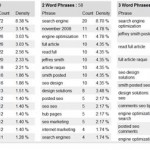 The process of how a website develops credibility and authority among its digital pier group is rather intriguing. One moment your clawing and scratching just to get anyone to notice your site exists, then the next thing you know your website has more traffic from your preferred audience from search engines on accident than most of your competitors dream of receiving on purpose.
The process of how a website develops credibility and authority among its digital pier group is rather intriguing. One moment your clawing and scratching just to get anyone to notice your site exists, then the next thing you know your website has more traffic from your preferred audience from search engines on accident than most of your competitors dream of receiving on purpose.

But what is this distinguishing factor of authority? is it something tangible you can assess? and how can you toggle it to advance up the ranks?
Considering that each page is part of a constantly changing landscape, yet at the same time is a puzzle that as a whole leaves an imprint on search engines and how they view your content. Often this holistic attribute is not easily identified by default, but rather represents a maturation of parallel proportions.
Search engines see your site in bits and pieces. Think of it like a lens, this lens (assembly of information) determines how your site is viewed by search engines, it is a component of the algorithm which is similar to data clustering creates a hierarchial assessment of co-occurrence, semantic keyword density, proximity and numerous relationships that comprise your website.
As a result, if all of the indicators combine in a favorable fashion, your relevance score increases for the terms most identified within the relationships your imprint leaves behind. Talk about a subject long enough (and in enough ways) and search engines assess your site as an authority on the topic.
There are several metrics that can toggle this phenomenon, but at the root of this equation are distinct algorithmic attributes that are responsible for shifting the way search engines interpret and share your pages with the world abroad.
One of them is keyword stemming, keyword stemming occurs over time when inbound links share a common denominator, yet each denominator has a larger topical reference.
For example, it doesn’t matter if I am talking about CPM conversion rates, reach or exposure, if I use enough semantic phrases that overlap, search engines know I am speaking about marketing. Similarly if I were speaking about poplar, pine or oak, it would derive I am speaking about trees.
This topical relevance is the first stage of authority and lends itself to the next stage with is keyword stemming. The process of stemming occurs when you have exceptionally high quantities of emperical data on a subject shared across multiple pages.
Like an internal taxonomy (a tagging mechanism), the interrelated aspects of the subject become buoyant and fuse as topics within the data cloud of your website.
Bits and pieces floating about with the ability to merge and unify at moments notice to satisfy the vacuum of a query is a characteristic of data retrieval. Granted that you provide the appropriate indicators, have the information structured in such a way that is logically lends itself to being parsed and indexed, eventually your site takes on an air of authority about the topic.
As a result, even though you sparsely mention topic A on page 1, search engines cross-reference all of the information present on all of your pages about topic A and determine the extent of expertise your site has about topic A based on internal and external link reputation.
This is grossly oversimplified, however if page A has the authoritative vote from within your site (through reference, navigation or internal linking) and enough momentum from external sites (by way of reference / links) then your page is assigned with a value and tagged in the index with an accommodating relevance score.
If your score is higher than your competitors for that specific query, your page is returned higher in the list in the index. Authority sites experience this by-product of skipping to the front of the line with essentially any page they publish.
So, in essence, the goal is not just link popularity (as the focus was in the past) the real objective of SEO is website authority and ranking for hundreds or potential combinations instead of just a few per page.








Detailed explanation on the tagging and its relevance has given a well defined portfolio.The explanation and intelinking of subject gives a good detailing